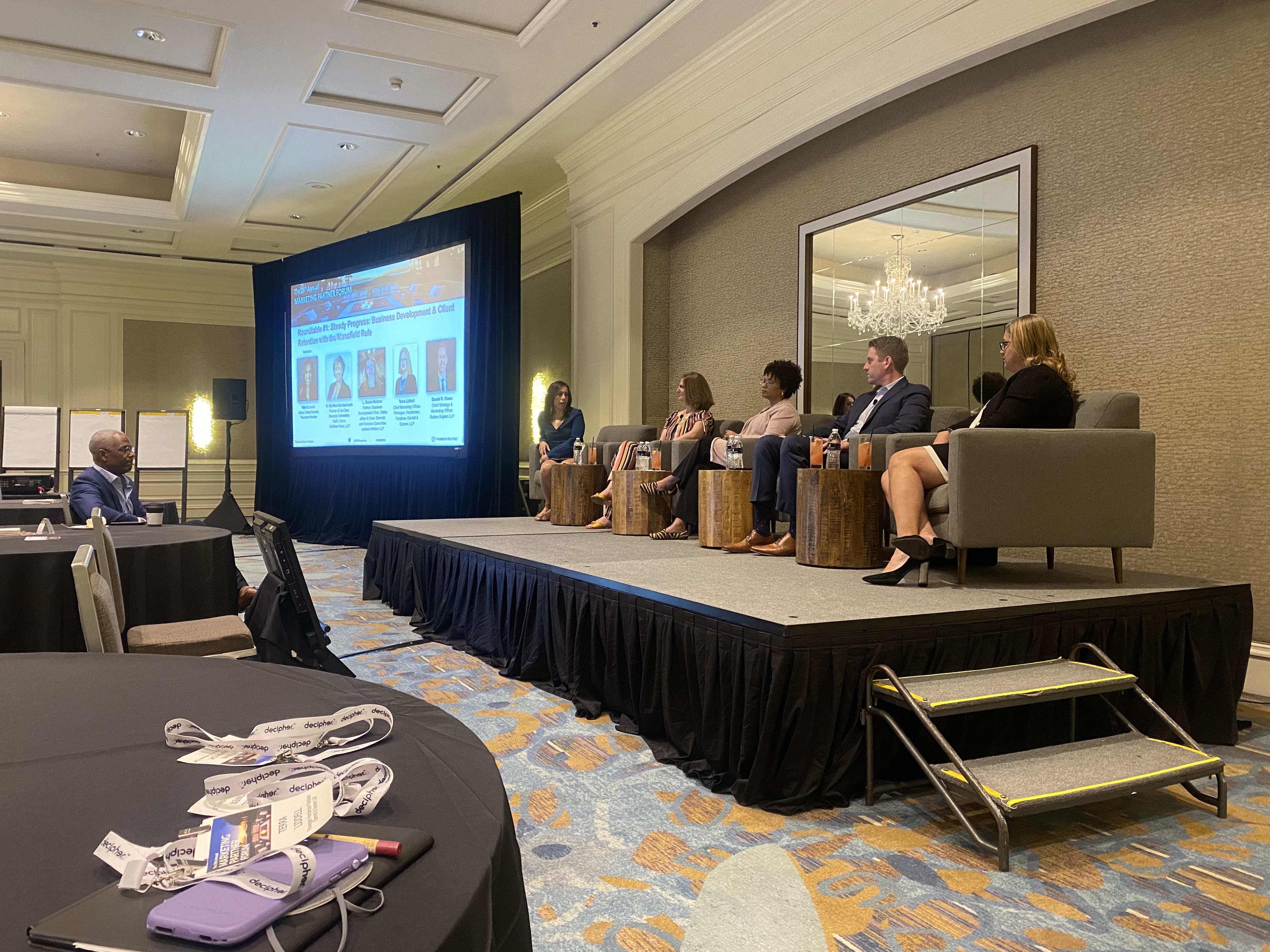Last week I attended the Marketing Partner Forum in Florida. On top of being my first in-person event in two years, one of the best things to hear face-to-face was how the biggest, most influential firms in the world are becoming more inclusive.
This post is a summary of a few panel discussions, conversations had at the event and a general outlook from around the event. I have provided the relevant links to everyone mentioned at the bottom of this post.

THE WHY?
Daniel Owen from Robins Kaplan summed it with, "We have gotten past the 'why are we doing this?', it is going to make us better and, because of that, provide a better solution to every client." What's not to like?
Martine Cumbermack of Swift Currie said that, frankly, it was the right thing to do and Suzan Kedron of Jackson Walker added that for anyone with any concerns over investing in Inclusive polices, such as the Mansfield rule, "we are spending all this money, and we are going to get it back tenfold!"
IT STARTS WITH WHO WE ARE
John Page said something particularly pertinent during an earlier discussion that, "Corporate Social Responsibility is a big collection of words which sums up who we are. It's who we are as a firm. The things we care about." We show 'Who we are' through our actions, not through our words.
Nita Cumello (Thomson Reuters) then neatly summed up the issue at hand with "If you always do what you’ve always done, you’ll always get what you’ve always got.” So, for law firms who espouse the values of inclusivity and fairness, they need to change their behaviours from top to bottom.
DATA-LED TRANSPARENCY AND ACCOUNTABILITY: THE MANSFIELD RULE
Martine Cumbermack stated bluntly, they aim for a 50-50 gender split when recruiting for Junior Associates, yet by the time they get to leadership positions, they are more often than not filled by white middle-aged men. Something had to change!
Enter, the Mansfield Rule. Before this event, I had never even heard of the Mansfield Rule, so, for the uneducated like me, click here for the most up-to-date info, but in short... one of its core principles is that a firm will demonstrate that at least 30% of the candidates interviewed for any leadership roles are women, lawyers from underrepresented racial/ethnic groups, lawyers with disabilities, or LGBTQ+ lawyers.
Terra Liddell spoke at length on the transparency involved in the recruitment process for her own business development team at Finnegan. For example, using an experience database which accurately tracks key data points throughout the recruitment process to ensure that for every position filled, that they have met and exceeded these Mansfield requirements.
CELEBRATE YOUR SUCCESS
And the effects of such transparency and accountability? 68% of the Finnegan team leads at a recent pitch were Mansfield certified.
However, much more than a figure in spreadsheet, there has been a genuine shift in culture at Finnegan to celebrate people from all backgrounds, abilities and beliefs and these shared values come out in every interaction across the business. Terra's Marketing team have even equipped her teams with a 'one pager' which summarises the Inclusivity and Diversity at Finnegan. It is something everyone wants be a part of rather than a Human Resources initiative. Moreover, it's authentic and a competitive edge.
FIND YOUR ALLIES AND EMPOWER THEM
You can't do this alone. Suzan Kedron talked about her four Pillars of Inclusion: Marketing & Business Development; Attorney Development; Recruitment; and Cultural Awareness. To drive change you need individual pillar captains; people who want to take up the challenge to educate and be that go-to person within their team.
TAKE OUTSIDE HELP
You aren't expected to know everything. The same way people come to you for professional legal advice, take outside help (from Diversity Lab, external consultants etc.), speak to your peers who are on the same journey and involve your clients with your efforts.
Again, it's not a burden! As Suzan Kedron said, you are investing time and money to make yourself better.
BUSINESS DEVELOPMENT / CLIENT DEMAND
| refer back to Daniel Owen beautifully blunt point earlier: We are beyond the 'Why?'
But to further emphasise this point, Terra mentioned that in the last week alone Finnegan had submitted four clients surveys from companies wanting to see the numbers behind their Inclusion and Diversity policies. Furthermore, Martine Cumbermack talked about answering the question of not only, 'Who is going to pitch?' but clients want to know who will be working on their file.
Inclusion is no longer a tickbox exercise or a nice section on the website, it is of strategic importance to your business. The message is that this is to be expected of all firms going forward.
REPETITION
The panel were in agreement that if it is worth saying once, it is worth repeating. Normalise the discussion, celebrate your shared commitments and successes to build for the future.
People mentioned
- Nita Cumello, Global Client Director, Thomson Reuters
- K. Martine Cumbermack, Partner & Co-Chair, Diversity Committee, Swift, Currie, McGhee Hiers, LLP
- L. Suzan Kedron, Partner; Business Development Chair, Dallas office & Chair, Diversity and Inclusion Committee, Jackson Walker LLP
- Terra Liddell, Chief Marketing Officer, Finnegan, Henderson, Farabow, Garrett & Dunner, LLP
- Daniel R. Owen, Chief Strategy & Marketing Officer, Robins Kaplan LLP
- John Page, Senior Vice President, Chief Corporate Social Responsibility Officer & Chief Legal Officer, Golden State Foods





/Passle/53d0c8edb00e7e0540c9b34b/MediaLibrary/Images/2025-06-24-15-50-59-531-685ac963d81bf11b7522dd8e.png)
/Passle/53d0c8edb00e7e0540c9b34b/MediaLibrary/Images/2026-01-26-00-33-49-963-6976b66dc26ba4a239c0742b.jpg)
/Passle/53d0c8edb00e7e0540c9b34b/MediaLibrary/Images/2026-02-05-19-17-38-445-6984ecd2d522dbbaed5fa13c.png)
/Passle/53d0c8edb00e7e0540c9b34b/MediaLibrary/Images/2026-02-04-15-05-10-466-69836026ae0e4cf738ed4f9f.png)
/Passle/53d0c8edb00e7e0540c9b34b/MediaLibrary/Images/2026-02-01-16-17-51-126-697f7cafc6793e6990c55114.JPG)



